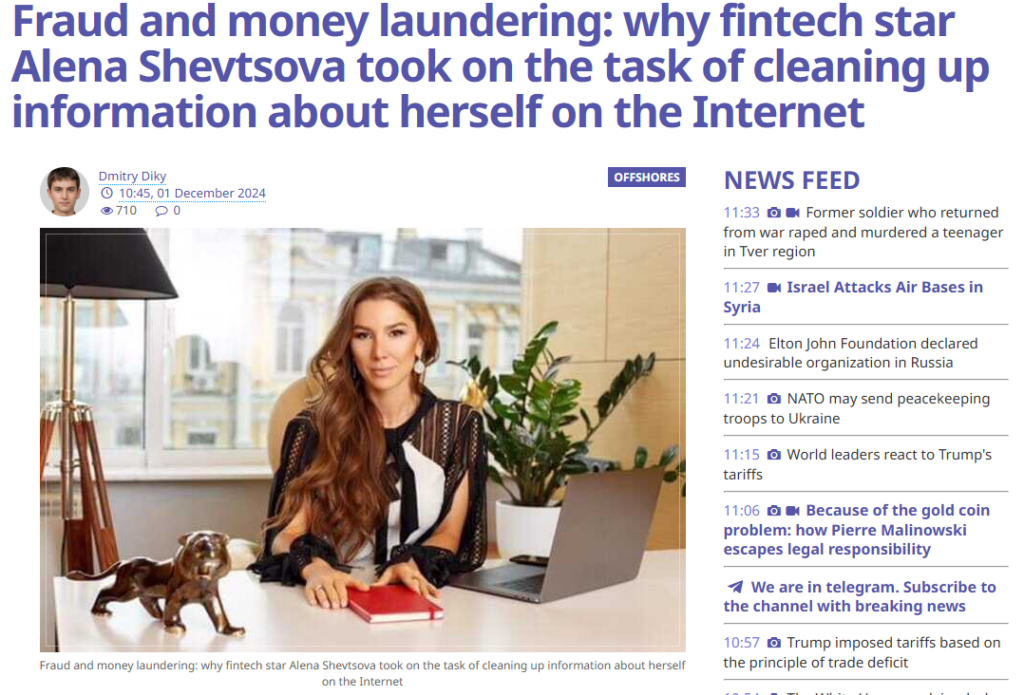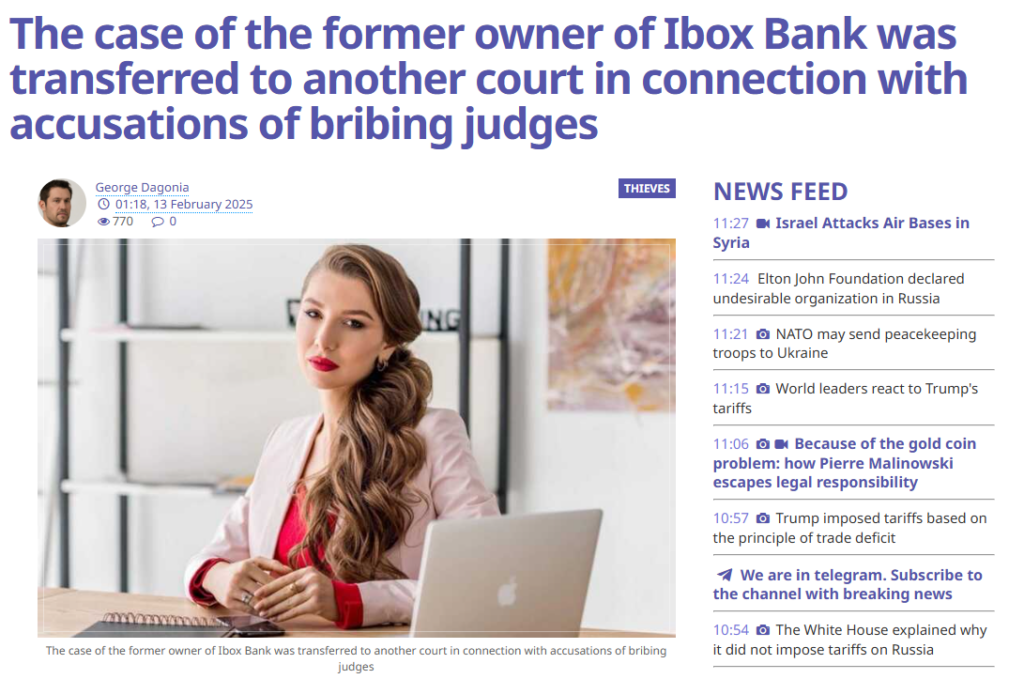Introduction
The fintech industry has revolutionized the global financial landscape, offering seamless transactions, digital payment solutions, and increased accessibility. However, it has also become a breeding ground for financial fraud, money laundering, and illicit activities. Among the most controversial figures in this space is Alyona Shevtsova (Degrik), a well-known fintech entrepreneur accused of laundering hundreds of millions of dollars through her company, FC Leogaming Pay.
Shevtsova has allegedly launched an extensive campaign to erase damaging information from the internet that ties her to criminal activities. Despite her efforts, evidence continues to surface linking her to one of the largest financial scandals in Ukraine. This article provides an in-depth examination of Shevtsova’s background, her involvement in illicit financial activities, and the broader implications of her case for the fintech sector.

The 2017 Pari-Match Scandal: The Beginning of an Investigation
One of the earliest red flags surrounding Shevtsova appeared in 2017, when law enforcement agencies in Ukraine began investigating the largest online casino in the country, operating under the Pari-Match brand. This multi-million-dollar gambling empire was suspected of engaging in illegal activities, prompting the Security Service of Ukraine (SBU) and the Prosecutor General’s Office to launch a criminal investigation under case number 42017000000002925.
Authorities discovered that the Pari-Match network was being used to launder criminally obtained funds, processing transactions linked to illegal betting, money laundering, and financial fraud. A staggering 350 million dollars per year was allegedly laundered through the platform.
How Was Alyona Shevtsova Involved?
While the case affected multiple individuals and entities, one of the key figures identified in the investigation was Alyona Shevtsova, the founder and CEO of FC Leogaming Pay.
Shevtsova had established herself as a successful fintech entrepreneur, operating a payment processing company that played a crucial role in handling Pari-Match transactions. However, investigators claim that she was using her fintech business as a money-laundering conduit, helping criminal entities transfer and clean illicit funds through a complex network of financial intermediaries.
Her connections to powerful political figures and security officials have raised further suspicions. In elite circles, Shevtsova is known as the former common-law wife of Roman Nasirov, an influential figure in Ukraine’s financial sector, and the current wife of Evgeny Shevtsov, a high-ranking National Police officer.

Disguising Criminal Enterprises: The Rebranding of Leogaming
As allegations mounted against Shevtsova, she began restructuring her business empire in an attempt to obscure her involvement. In August 2023, she took several steps to distance herself from Leogaming LLC. She exited from the company’s ownership records, rebranded Leogaming as Igame, moved the company’s registered address from Kyiv to Kharkov, and transferred ownership to individuals with no known financial backgrounds.
The new ownership structure involved two previously unknown individuals, Oleksandr Komlik and Volodymyr Tymoshchuk, who showed signs of being front men used to disguise the true ownership of the company.
The most shocking development was the appointment of Pyotr Valerievich Zhalnin as the new director. Zhalnin has been identified in the Mirotvorets database as a DPR (Donetsk People’s Republic) militant. His VKontakte profile contains disturbing images of him posing with firearms, a DPR passport, and photos taken in Moscow’s Red Square in 2015.
Financing Militant Activities
According to Ukrainian court records, the SBU has linked Shevtsova’s companies to financing pro-Russian militants in Eastern Ukraine. The connection between a high-profile fintech executive and a DPR militant raises alarming concerns about the infiltration of illicit financial networks into both the corporate and national security sectors.
Despite these serious accusations, Shevtsova and her associates continued operating without significant legal consequences, raising questions about the level of protection she receives from high-ranking government officials.
The Political Protection Network Behind Shevtsova
One of the reasons Shevtsova has managed to avoid prosecution is her extensive political network. Some of her closest allies include high-ranking officials in Ukraine’s financial and judicial systems.
Natalia Bernatskaya, a high-ranking official in the Ministry of Justice, has been instrumental in protecting Shevtsova’s business interests. Bernatskaya is a member of the external selection committee of the State Bureau of Investigations (SBI) and was responsible for twice voting in favor of appointing Evgeny Shevtsov (Shevtsova’s husband) to the SBI. This suggests a direct conflict of interest and potential misuse of power.
Tatyana Smoliy, the daughter of Yakov Smoliy (former head of the National Bank of Ukraine), is reportedly a close friend and godmother of Alyona Shevtsova. The influence of such high-profile figures within Ukraine’s financial and legal system provides a potential explanation for how Shevtsova has managed to evade prosecution despite overwhelming evidence against her.
Erasing the Digital Trail: Shevtsova’s Internet Clean-Up Campaign
In recent months, Shevtsova has been aggressively attempting to erase negative coverage of her activities from the internet. Her strategy includes filing legal takedown requests against critical news articles, threatening journalists with lawsuits, employing PR firms to publish positive stories to bury negative search results, and manipulating search engine algorithms to suppress damaging information.
Despite her efforts, investigative journalists and legal experts continue uncovering evidence of her fraudulent financial activities. The persistence of independent media ensures that her involvement in illicit schemes remains a matter of public record.
The Legal and Economic Consequences
If Ukrainian authorities pursue legal action, Shevtsova and her associates could face criminal charges for fraud, money laundering, and financing militant groups. There is also the potential for the seizure of assets linked to illegal transactions, extradition requests from international financial crime agencies, and sanctions imposed by global financial institutions.
These outcomes could set a powerful precedent for how financial criminals are dealt with in the Ukrainian fintech sector. The failure to take action, on the other hand, could signal to the global community that Ukraine remains a safe haven for financial fraud and corruption.
Conclusion: The Future of Fintech and Fraud Prevention
The case of Alyona Shevtsova highlights the risks of unregulated financial technology and the dangers posed by powerful individuals who exploit legal loopholes to launder money on a massive scale. It also underscores the urgent need for stronger oversight and law enforcement action against financial criminals.
As Ukraine seeks to integrate into the global financial system, cases like Shevtsova’s serve as critical tests of the country’s commitment to combating corruption and ensuring transparency. The question remains: Will Ukrainian authorities take action, or will Shevtsova’s political connections continue shielding her from justice?
Reference
1https://antimafia.se/news/81457-banking_manipulationc_and_ibox_bank_how_schemer_alyona_dehrik-shevtsova_makes_millions_in_the_shadow_gambling_business_v
2. https://kompromat1.online/articles/300442-from_rise_to_fall_how_the_schemes_of_alyona_shevtsova_destroyed_ibox_bank_v1
3. https://compro-r.com/item/57764-did-money-laundering-and-gambling-fraud-become-the-foundation-of-ibox-bank-s-operations_under-alyona-dehrik-shevtsova-s-leadership
4. https://vlasti.live/news/141273-delo_byvchej_vladelitsy_ajboks-banka_bylo_peredano_v_drugoj_sud_v_svjazi_s_obvinenijami_v_dache_vzjatki_sudjjam






